- Home
- Jr. Horatio Alger
Paul the Peddler; Or, The Fortunes of a Young Street Merchant Page 2
Paul the Peddler; Or, The Fortunes of a Young Street Merchant Read online
Page 2
CHAPTER II
PAUL AT HOME
Paul went up Centre street and turned into Pearl. Stopping before atenement-house, he entered, and, going up two flights of stairs, openeda door and entered.
"You are home early, Paul," said a woman of middle age, looking up athis entrance.
"Yes, mother; I've sold out."
"You've not sold out the whole fifty packages?" she asked, in surprise.
"Yes, I have. I had capital luck."
"Why, you must have made as much as a dollar, and it's not twelve yet."
"I've made more than that, mother. Just wait a minute, till I'vereckoned up a little. Where's Jimmy?"
"Miss Beckwith offered to take him out to walk with her, so I let himgo. He'll be back at twelve."
While Paul is making a calculation, a few words of explanation anddescription may be given, so that the reader may understand better howhe is situated.
The rooms occupied by Paul and his mother were three in number. Thelargest one was about fourteen feet square, and was lighted by twowindows. It was covered with a neat, though well-worn, carpet; a fewcane-bottomed chairs were ranged at the windows, and on each side of thetable. There was a French clock on the mantel, a rocking chair for hismother, and a few inexpensive engravings hung upon the walls. There wasa hanging bookcase containing two shelves, filled with books, partlyschool books, supplemented by a few miscellaneous books, such as"Robinson Crusoe," "Pilgrim's Progress," a volume of "PoeticalSelections," an odd volume of Scott, and several others. Out of the mainroom opened two narrow chambers, both together of about the same area asthe main room. One of these was occupied by Paul and Jimmy, the other byhis mother.
Those who are familiar with the construction of a New Yorktenement-house will readily understand the appearance of the rooms intowhich we have introduced them. It must, however, be explained that fewsimilar apartments are found so well furnished. Carpets are not verycommon in tenement-houses, and if there are any pictures, they areusually the cheapest prints. Wooden chairs, and generally every objectof the cheapest, are to be met with in the dwellings of the New Yorkpoor. If we find something better in the present instance, it is notbecause Paul and his mother are any better off than their neighbors. Onthe contrary, there are few whose income is so small. But they have seenbetter days, and the furniture we see has been saved from the time oftheir comparative prosperity.
As Paul is still at his estimate, let us improve the opportunity bygiving a little of their early history.
Mr. Hoffman, the father of Paul, was born in Germany, but came to NewYork when a boy of twelve, and there he grew up and married, his wifebeing an American. He was a cabinetmaker, and, being a skillful workman,earned very good wages, so that he was able to maintain his family incomfort. They occupied a neat little cottage in Harlem, and lived veryhappily, for Mr. Hoffman was temperate and kind, when an unfortunateaccident clouded their happiness, and brought an end to theirprosperity. In crossing Broadway at its most crowded part, the husbandand father was run over by a loaded dray, and so seriously injured thathe lived but a few hours. Then the precarious nature of their prosperitywas found out. Mr. Hoffman had not saved anything, having always livedup to the extent of his income. It was obviously impossible for them tocontinue to live in their old home, paying a rent of twenty dollars permonth. Besides, Paul did not see any good opportunity to earn his livingin Harlem. So, at his instigation, his mother moved downtown, and tookrooms in a tenement-house in Pearl street, agreeing to pay six dollarsa month for apartments which would now command double the price. Theybrought with them furniture enough to furnish the three rooms, sellingthe rest for what it would bring, and thus obtaining a small reservefund, which by this time was nearly exhausted.
Once fairly established in their new home, Paul went out into thestreets to earn his living. The two most obvious, and, on the whole,most profitable trades, were blacking boots and selling newspapers. Tothe first Paul, who was a neat boy, objected on the score that it wouldkeep his hands and clothing dirty, and, street boy though he had become,he had a pride in his personal appearance. To selling papers he had notthe same objection, but he had a natural taste for trade, and this ledhim to join the ranks of the street peddlers. He began with vendingmatches, but found so much competition in the business, and receivedso rough a reception oftentimes from those who had repeated calls fromothers in the same business, that he gave it up, and tried somethingelse. But the same competition which crowds the professions and thehigher employments followed by men, prevails among the street tradeswhich are pursued by boys. If Paul had only had himself to support,he could have made a fair living at match selling, or any other of theemployments he took up; but his mother could not earn much at makingvests, and Jimmy was lame, and could do nothing to fill the commonpurse, so that Paul felt that his earnings must be the main support ofthe family, and naturally sought out what would bring him in most money.
At length he had hit upon selling prize packages, and his firstexperience in that line are recorded in the previous chapter. Addingonly that it was now a year since his father's death, we resume ournarrative.
"Do you want to know how much I've made, mother?" asked Paul, looking upat length from his calculation.
"Yes, Paul."
"A dollar and thirty cents."
"I did not think it would amount to so much. The prizes came toconsiderable, didn't they?"
"Listen, and I will tell you how I stand:
One pound of candy . . . . . . . . .20 Two packs of envelopes . . . . . . . .10 Prize. . . . . . . . . . . . . . . . .90
---- That makes . . . . . . . . . . . . $1.20
I sold the fifty packages at five cents each, and that brought me in twodollars and a half. Taking out the expenses, it leaves me a dollar andthirty cents. Isn't that doing well for one morning's work?"
"It's excellent; but I thought your prizes amounted to more than ninetycents."
"So they did, but several persons who bought wouldn't take their prizes,and that was so much gain."
"You have done very well, Paul. I wish you might earn as much everyday."
"I'm going to earn some more this afternoon. I bought a pound of candyon the way home, and some cheap envelopes, and I'll be making up a newstock while I am waiting for dinner."
Paul took out his candy and envelopes, and set about making up thepackages.
"Did any complain of the small amount of candy you put in?"
"A few; but most bought for the sake of the prizes."
"Perhaps you had better be a little more liberal with your candy, andthen there may not be so much dissatisfaction where the prize is only apenny."
"I don't know but your are right, mother. I believe I'll only makethirty packages with this pound, instead of fifty. Thirty'll be all Ican sell this afternoon."
Just then the door opened, and Paul's brother entered.
Jimmy Hoffman, or lame Jimmy, as he was often called, was adelicate-looking boy of ten, with a fair complexion and sweet face, butincurably lame, a defect which, added to his delicate constitution,was likely to interfere seriously with his success in life. But, asfrequently happens, Jimmy was all the more endeared to his motherand brother by his misfortune and bodily weakness, and if either wereobliged to suffer from poverty, Jimmy would be spared the suffering.
"Well, Jimmy, have you had a pleasant walk?" asked his mother.
"Yes, mother; I went down to Fulton Market. There's a good deal to seethere."
"A good deal more than in this dull room, Jimmy."
"It doesn't seem dull to me, mother, while you are here. How did youmake out selling your prize packages?"
"They are all sold, Jimmy, every one. I am making some more."
"Shan't I help you?"
"Yes, I would like to have you. Just take those envelopes, and writeprize packages on every one of them."
"All right, Paul," and Jimmy, glad to be of use, got the pen and ink,and, gathering up the envelopes, began to
inscribe them as he had beeninstructed.
By the time the packages were made up, dinner was ready. It was not avery luxurious repast. There was a small piece of rump steak--not morethan three-quarters of a pound--a few potatoes, a loaf of bread, and asmall plate of butter. That was all; but then the cloth that coveredthe table was neat and clean, and the knives and forks were as bright asnew, and what there was tasted good.
"What have you been doing this morning, Jimmy?" asked Paul.
"I have been drawing, Paul. Here's a picture of Friday. I copied it from'Robinson Crusoe.'"
He showed the picture, which was wonderfully like that in the book, forthis--the gift of drawing--was Jimmy's one talent, and he possessed itin no common degree.
"Excellent, Jimmy!" said Paul. "You're a real genius. I shouldn't besurprised if you'd make an artist some day."
"I wish I might," said Jimmy, earnestly. "There's nothing I'd likebetter."
"I'll tell you what, Jimmy. If I do well this afternoon, I'll buy you adrawing-book and some paper, to work on while mother and I are busy."
"If you can afford it, Paul, I should like it so much. Some time I mightearn something that way."
"Of course you may," said Paul, cheerfully. "I won't forget you."
Dinner over, Paul went out to business, and was again successful,getting rid of his thirty packages, and clearing another dollar. Half ofthis he invested in a drawing-book, a pencil and some drawing-paper forJimmy. Even then he had left of his earnings for the day one dollar andeighty cents. But this success in the new business had already excitedenvy and competition, as he was destined to find out on the morrow.

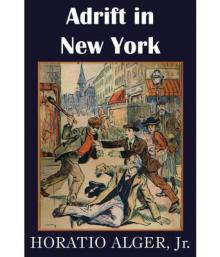 Adrift in New York: Tom and Florence Braving the World
Adrift in New York: Tom and Florence Braving the World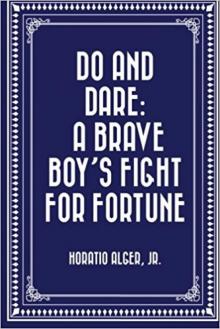 Do and Dare — a Brave Boy's Fight for Fortune
Do and Dare — a Brave Boy's Fight for Fortune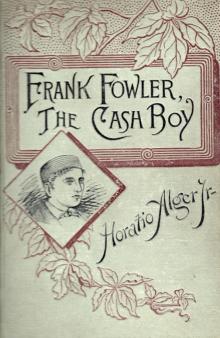 The Cash Boy
The Cash Boy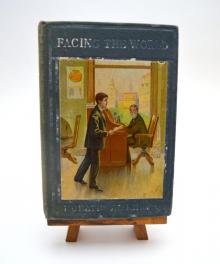 Facing the World
Facing the World The Young Explorer; Or, Claiming His Fortune
The Young Explorer; Or, Claiming His Fortune The Store Boy
The Store Boy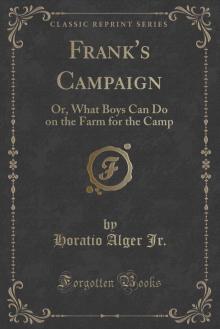 Frank's Campaign; Or, The Farm and the Camp
Frank's Campaign; Or, The Farm and the Camp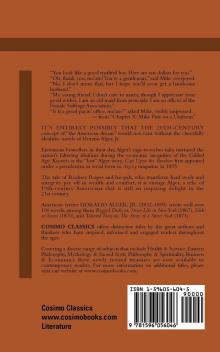 Cast Upon the Breakers
Cast Upon the Breakers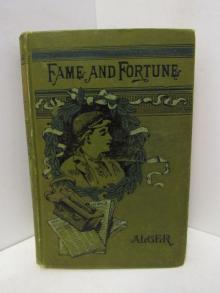 Fame and Fortune; or, The Progress of Richard Hunter
Fame and Fortune; or, The Progress of Richard Hunter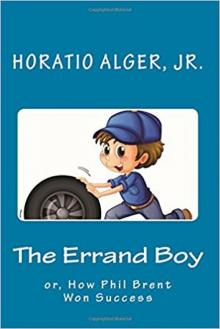 The Errand Boy; Or, How Phil Brent Won Success
The Errand Boy; Or, How Phil Brent Won Success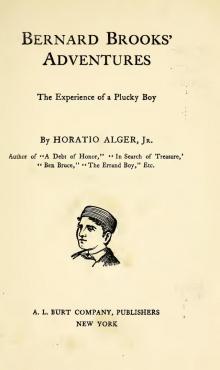 Bernard Brooks' Adventures: The Experience of a Plucky Boy
Bernard Brooks' Adventures: The Experience of a Plucky Boy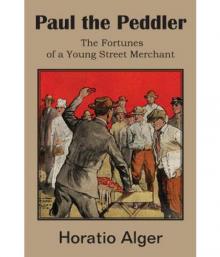 Paul the Peddler; Or, The Fortunes of a Young Street Merchant
Paul the Peddler; Or, The Fortunes of a Young Street Merchant Brave and Bold; Or, The Fortunes of Robert Rushton
Brave and Bold; Or, The Fortunes of Robert Rushton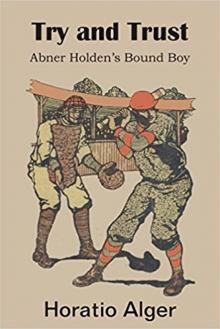 Try and Trust; Or, Abner Holden's Bound Boy
Try and Trust; Or, Abner Holden's Bound Boy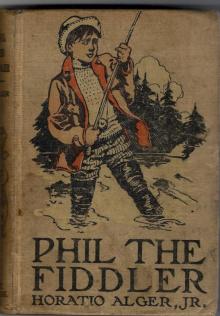 Phil, the Fiddler
Phil, the Fiddler In A New World; or, Among The Gold Fields Of Australia
In A New World; or, Among The Gold Fields Of Australia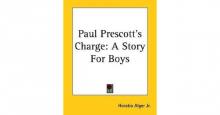 Paul Prescott's Charge
Paul Prescott's Charge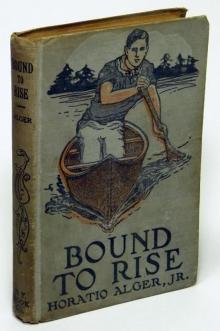 Joe's Luck; Or, Always Wide Awake
Joe's Luck; Or, Always Wide Awake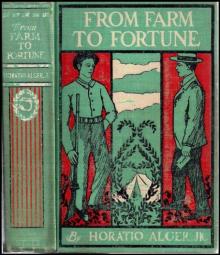 From Farm to Fortune; or, Nat Nason's Strange Experience
From Farm to Fortune; or, Nat Nason's Strange Experience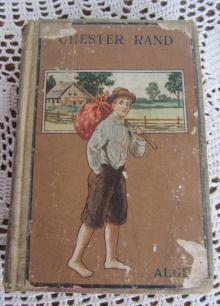 Chester Rand; or, The New Path to Fortune
Chester Rand; or, The New Path to Fortune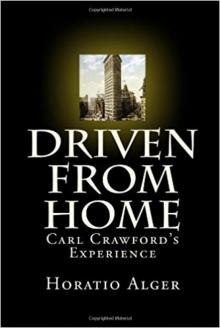 Driven from Home; Or, Carl Crawford's Experience
Driven from Home; Or, Carl Crawford's Experience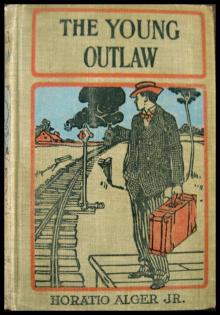 The Young Outlaw; or, Adrift in the Streets
The Young Outlaw; or, Adrift in the Streets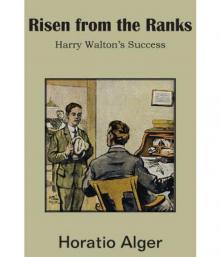 Risen from the Ranks; Or, Harry Walton's Success
Risen from the Ranks; Or, Harry Walton's Success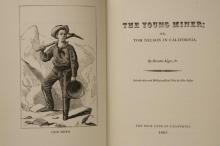 The Young Miner; Or, Tom Nelson in California
The Young Miner; Or, Tom Nelson in California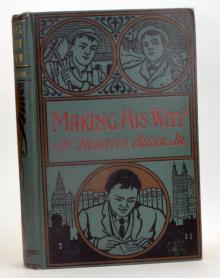 Making His Way; Or, Frank Courtney's Struggle Upward
Making His Way; Or, Frank Courtney's Struggle Upward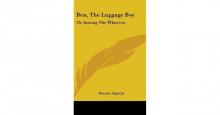 Ben, the Luggage Boy; Or, Among the Wharves
Ben, the Luggage Boy; Or, Among the Wharves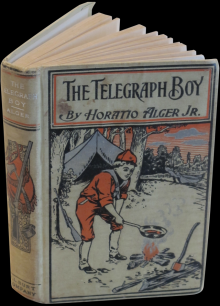 The Telegraph Boy
The Telegraph Boy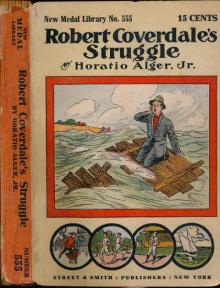 Robert Coverdale's Struggle; Or, on the Wave of Success
Robert Coverdale's Struggle; Or, on the Wave of Success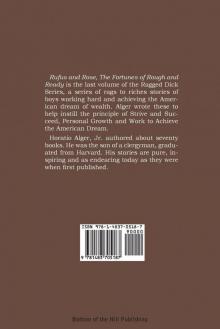 Rufus and Rose; Or, The Fortunes of Rough and Ready
Rufus and Rose; Or, The Fortunes of Rough and Ready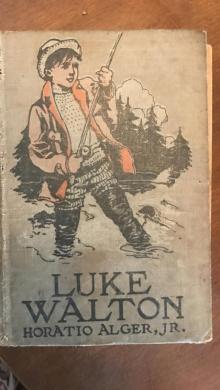 Luke Walton
Luke Walton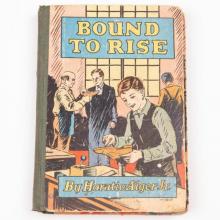 Mark Mason's Victory: The Trials and Triumphs of a Telegraph Boy
Mark Mason's Victory: The Trials and Triumphs of a Telegraph Boy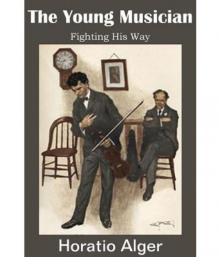 The Young Musician; Or, Fighting His Way
The Young Musician; Or, Fighting His Way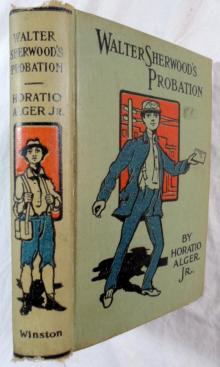 Walter Sherwood's Probation
Walter Sherwood's Probation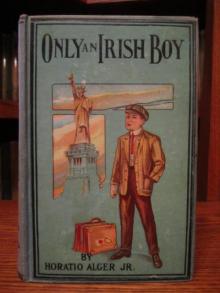 Only an Irish Boy; Or, Andy Burke's Fortunes
Only an Irish Boy; Or, Andy Burke's Fortunes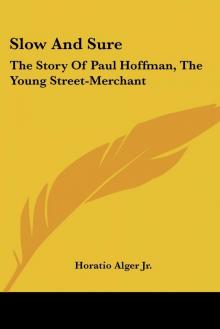 Slow and Sure: The Story of Paul Hoffman the Young Street-Merchant
Slow and Sure: The Story of Paul Hoffman the Young Street-Merchant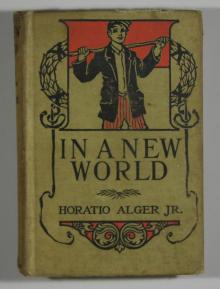 Herbert Carter's Legacy; Or, the Inventor's Son
Herbert Carter's Legacy; Or, the Inventor's Son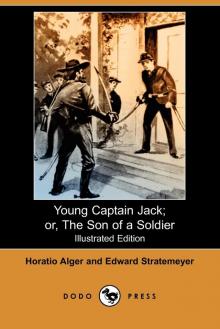 Young Captain Jack; Or, The Son of a Soldier
Young Captain Jack; Or, The Son of a Soldier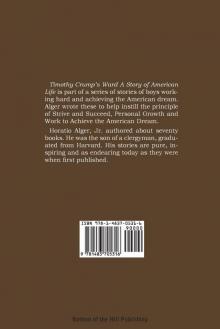 Timothy Crump's Ward: A Story of American Life
Timothy Crump's Ward: A Story of American Life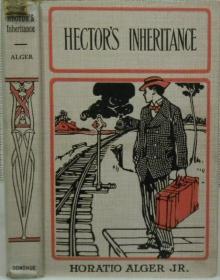 Hector's Inheritance, Or, the Boys of Smith Institute
Hector's Inheritance, Or, the Boys of Smith Institute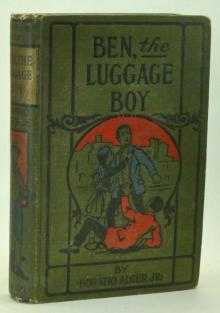 Ben's Nugget; Or, A Boy's Search For Fortune
Ben's Nugget; Or, A Boy's Search For Fortune